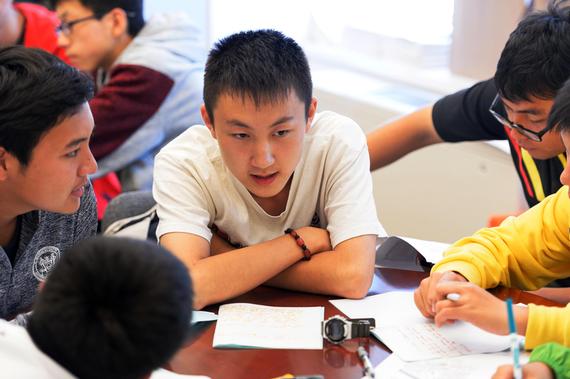
My students are immigrants from over 40 different countries. Often, they have recently arrived to the United States, and are thrust into a new city, a new language, and a new culture. They live with caregivers they either have never met before or haven’t seen in years and live in less than ideal conditions. With this life experience, they bring a worldview that isoften wise beyond their years. Many of them know what it means to be a victim or live under an oppressive regime where they have no voice. And many are taking great risks and experience great loss.
This is where I come in as their educator. I need to find ways to engage my students who are in these challenging circumstances so they can thrive and succeed. In 1996, I created a special English as a Second Language (ESL) class built around social justice and needed help bringing compelling content into the work. I had a plethora of activities to help students appreciate diversity and see the dangers of racism, prejudice, and stereotyping, but felt that without real world, real life examples these activities were lacking a certain depth.
That’s when I reached out to Facing History and Ourselves. Facing History provided that for me immediately. I finally had access to challenging texts with compelling content – from the Holocaust to the Rwandan Genocide. My students and I were suddenly immersed in a world of individual human stories, told through first person accounts, videos, and brilliantly prepared resources.
I noticed a difference in my students. They were having highly sensitive, complex conversations that are difficult in one’s native language. Yet here they were doing so in English, their second or third or fourth language! They were so immersed in the content, they didn’t even notice they were speaking and reading and writing in English. Their writing was thoughtful and well crafted, like Samira M. from Bangladesh who wrote, “From the first day I took this class it helped me get a better understanding of the world. Now I know better and I'm aware of contributing to my society. Now I take initiative, and rather than being judgmental of others, I try to be empathetic and insightful.”
What really worked for me was the Socratic Seminar – a teaching strategy I resisted for years because I feared it would be too challenging or sophisticated for my students’ reading and speaking abilities. After taking a Facing History webinar on this strategy in December, I immediately felt at ease. I not only was given supporting structures, but also saw videos of this technique used in other classrooms. I worked with my program associate to create and modify teaching tools for use in my classroom. Before I knew it, I was ready to conduct my own Socratic Seminar. And it turned out to be one of my most successful experiences with my students.
Since I had been covering the Syrian Refugee Crisis for several weeks, I made it the focus of our seminar. The discussion was so rich and students were so involved that I actually had to stop them because we ran out of time. Students talked non-stop, respectfully, and with great sophistication, without noticing. They discussed how refugees should be treated, what countries hold the biggest burden for helping, and many other complex topics, referring to texts and statistics from our weeks of study. They were so disappointed when it came to an end that they begged for a follow up session after the holiday break.
This is the type of engagement that every teacher dreams of. Facing History’s Socratic Seminar took me out of my comfort zone as a teacher, which allowed me to push my students even further. It allowed me to see even more how capable they are to have mature, difficult conversations in English with ease. It boosted their confidence and mine. And for these students, who have experienced so much in life already, that makes all the difference.
How has Facing History helped you when teaching English Language Learner (ELL) students? What strategies have you found helpful? Share your thoughts with us!

